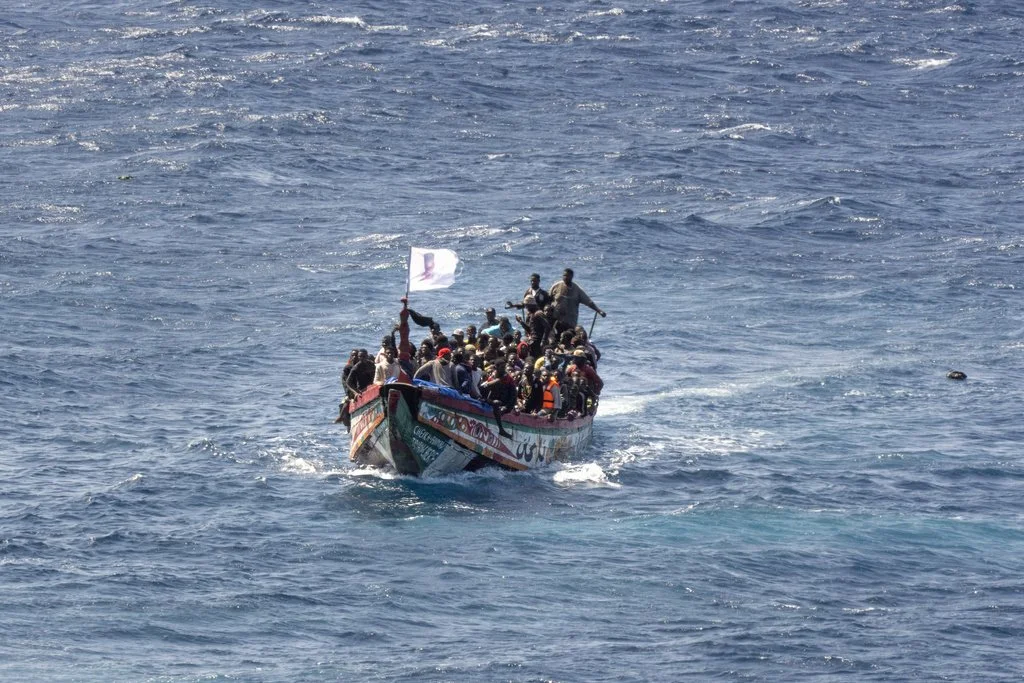Court Ruling Challenges Italy's Albanian Migration Plan Amid Growing Debate
Italian Navy ship Libra arriving in Albania on Oct 16 carrying the first wave of migrants source: AP Photo
Italy’s controversial five-year deal to send migrants rescued at sea by the Italian Coast Guard and Navy to processing centers in Albania has sparked legal challenges and widespread debate. The plan aims to detain up to 36,000 migrants a year at two Albanian camps while their asylum requests are being processed. At the end of the process, people either obtain an approved entrance to Italy or are returned to their home countries.
Yesterday a court in Rome ruled against this plan, deeming the return of migrants from countries such as Bangladesh and Egypt unlawful as these states are not considered "safe" under European human rights standards. This decision requires Italy to bring back the 12 migrants who have already been sent to Albania under the deal.
In May this year, the Italian government expanded the list of countries deemed as “safe”, giving Italy more leniency for the deportation of migrants. This is despite the fact that many of these countries, including Egypt, have documented cases of torture and other serious human rights violations. The Italian court’s ruling is in direct opposition to the expansion recently established by the Italian government, with the newly added countries being the main points of contention.
Despite these legal challenges, Italian Prime Minister Giorgia Meloni remains committed to the deal, presenting it as a long-term solution to Italy’s migration crisis. The right-leaning Italian government has vowed to appeal the court’s ruling, arguing that it should be the government—not the judiciary—that determines the safety of countries for migrant returns.
Meloni has championed the deal as a solution to irregular migration, framing it as a model for other European countries to follow. She views it as a way for Italy to manage the increasing number of migrants arriving via the Central Mediterranean route, and has presented the deal as an unprecedented step toward controlling borders more effectively. Indeed, Italy’s new example has piqued the interest of many other nations who are eagerly seeking solutions to the growing migrant problem in Europe. UK Prime Minister Keir Starmer recently revealed that last month he discussed the concept of the deal with Meloni. However, critics have expressed concern over the legality and human rights implications of the plan.
International organizations, such as the International Rescue Committee (IRC), have criticized the deal, highlighting the dangers it poses to migrants. According to Flaminia Delle Cese, the IRC’s Legal and Advocacy Adviser, “the centres in Albania should not exist in the first place.” The IRC emphasizes that such policies of deterrence do not prevent migrants from seeking safety but instead push them towards more dangerous routes.
Marta Welander, EU Advocacy Director for the IRC, has also warned that “it is vital that policymakers recognize the stark dangers of Italy’s approach, rather than using it as a blueprint for the bloc’s future asylum policies.” She argues that the Italian-Albanian deal threatens the right to asylum and is a step in the wrong direction for Europe.
The Human Rights Watch have also pointed out that the plan is costly and threatens rights, concluding “that Meloni’s government doesn’t have a sensible or humane approach to migration.” Meloni has also faced criticism from opposition leaders such as Elly Schlein of the Democratic Party, who proposed that the estimated cost of €800 million would be better spent on healthcare.
Consequently, the ruling by the Rome Court, combined with budding international and domestic opposition, raises important questions about the balance between national sovereignty and European law.
Migrants sailing to a Spanish port, source: AP Photo
This conflict is part of a broader, long-standing debate in Europe over reconciling migration management with international human rights obligations. As more countries face growing numbers of irregular migrants, the push for national solutions often clashes with the legal frameworks established by the European Union and international bodies like the ECHR. Meloni's plan reflects this friction as Italy seeks to assert control over its borders while navigating the legal complexities of European governance.
Ultimately, the court’s ruling against the Albanian deal underscores the tension between state sovereignty and supranational authority, a debate that will likely continue to shape migration policy across Europe in the coming years.


